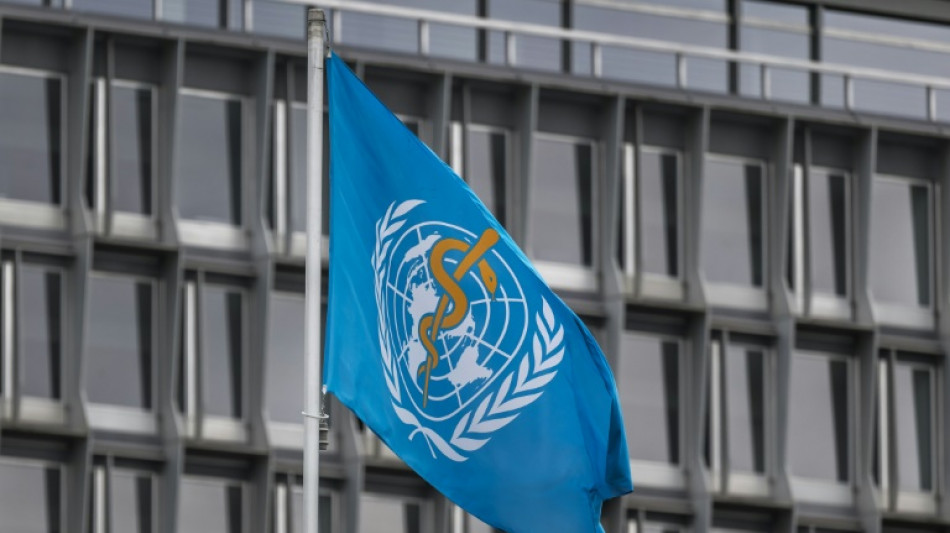
-
 Brazil's imprisoned Bolsonaro hospitalized ahead of surgery
Brazil's imprisoned Bolsonaro hospitalized ahead of surgery
-
Serbia court drops case against ex-minister over train station disaster
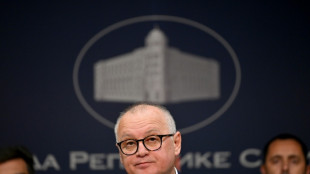
-
 Investors watching for Santa rally in thin pre-Christmas trade
Investors watching for Santa rally in thin pre-Christmas trade
-
David Sacks: Trump's AI power broker
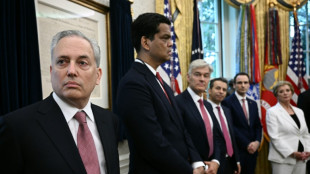
-
 Delap and Estevao in line for Chelsea return against Aston Villa
Delap and Estevao in line for Chelsea return against Aston Villa
-
Why metal prices are soaring to record highs

-
 Stocks tepid in thin pre-Christmas trade
Stocks tepid in thin pre-Christmas trade
-
UN experts slam US blockade on Venezuela

-
 Bethlehem celebrates first festive Christmas since Gaza war
Bethlehem celebrates first festive Christmas since Gaza war
-
Set-piece weakness costing Liverpool dear, says Slot

-
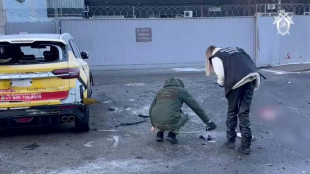 Two police killed in explosion in Moscow
Two police killed in explosion in Moscow
-
EU 'strongly condemns' US sanctions against five Europeans
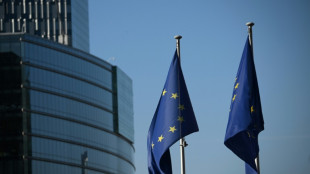
-
 Arsenal's Kepa Arrizabalaga eager for more League Cup heroics against Che;sea
Arsenal's Kepa Arrizabalaga eager for more League Cup heroics against Che;sea
-
Thailand-Cambodia border talks proceed after venue row
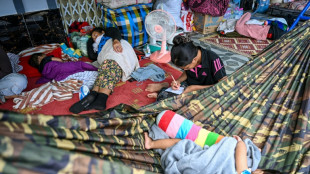
-
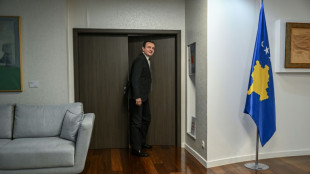 Kosovo, Serbia 'need to normalise' relations: Kosovo PM to AFP
Kosovo, Serbia 'need to normalise' relations: Kosovo PM to AFP
-
Newcastle boss Howe takes no comfort from recent Man Utd record

-
 Frank warns squad to be 'grown-up' as Spurs players get Christmas Day off
Frank warns squad to be 'grown-up' as Spurs players get Christmas Day off
-
Rome pushes Meta to allow other AIs on WhatsApp

-
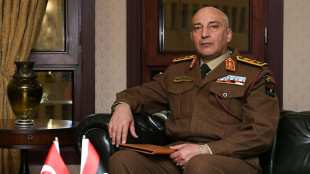 Black box recovered from Libyan general's crashed plane
Black box recovered from Libyan general's crashed plane
-
Festive lights, security tight for Christmas in Damascus

-
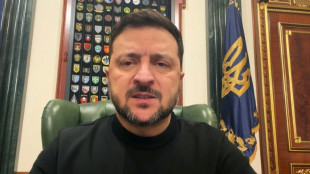 Zelensky reveals US-Ukraine plan to end Russian war, key questions remain
Zelensky reveals US-Ukraine plan to end Russian war, key questions remain
-
El Salvador defends mega-prison key to Trump deportations
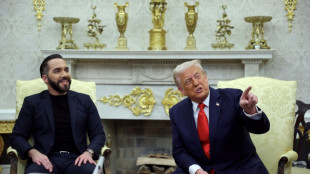
-
 Stranger Things set for final bow: five things to know
Stranger Things set for final bow: five things to know
-
Grief, trauma weigh on survivors of catastrophic Hong Kong fire

-
 Asian markets mixed after US growth data fuels Wall St record
Asian markets mixed after US growth data fuels Wall St record
-
Stokes says England player welfare his main priority

-
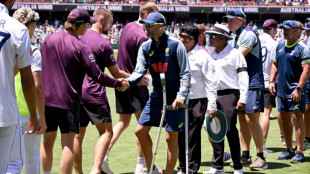 Australia's Lyon determined to bounce back after surgery
Australia's Lyon determined to bounce back after surgery
-
Stokes says England players' welfare his main priority

-
 North Korean POWs in Ukraine seeking 'new life' in South
North Korean POWs in Ukraine seeking 'new life' in South
-
Japanese golf star 'Jumbo' Ozaki dies aged 78

-
 Johnson, Castle shine as Spurs rout Thunder
Johnson, Castle shine as Spurs rout Thunder
-
Thai border clashes hit tourism at Cambodia's Angkor temples

-
 From predator to plate: Japan bear crisis sparks culinary craze
From predator to plate: Japan bear crisis sparks culinary craze
-
Asian markets mostly up after US growth fuels Wall St record

-
 'Happy milestone': Pakistan's historic brewery cheers export licence
'Happy milestone': Pakistan's historic brewery cheers export licence
-
Chevron: the only foreign oil company left in Venezuela

-
 US denies visas to EU ex-commissioner, four others over tech rules
US denies visas to EU ex-commissioner, four others over tech rules
-
SMX Is Transitioning From Single Deployments to Supply-Chain Infrastructure

-
 Each SMX Partnership Opens a Market, the Portfolio Multiplies the Value
Each SMX Partnership Opens a Market, the Portfolio Multiplies the Value
-
CORRECTION: Nextech3D.ai Provides Shareholder Update on Krafty Labs Acquisition and Announces $321,917 CEO Investment

-
 Why SMX's Partnerships Expand Value Faster Than Its Cost Base
Why SMX's Partnerships Expand Value Faster Than Its Cost Base
-
Dynamite Blockchain Delivers Record Q3 2025

-
 Cosmos Health Is Building a Platform, and Tariffs Are Accelerating the Strategy
Cosmos Health Is Building a Platform, and Tariffs Are Accelerating the Strategy
-
SMX's Integrated Value Proposition: One System, Many Markets, Compounding Leverage

-
 Dermata Therapeutics Announces up to $12.4 Million Private Placement Priced At-The-Market Under Nasdaq Rules
Dermata Therapeutics Announces up to $12.4 Million Private Placement Priced At-The-Market Under Nasdaq Rules
-
Goldgroup Secures Ownership of the San Francisco Gold Mine Acquiring 100% of Molimentales del Noroeste, S.A. De C.V.

-
 Alta Copper Announces Filing and Mailing of Meeting Materials for the Special Meeting of Shareholders and Optionholders to be Held on January 26, 2026
Alta Copper Announces Filing and Mailing of Meeting Materials for the Special Meeting of Shareholders and Optionholders to be Held on January 26, 2026
-
Pantheon Resources PLC Announces TR-1: Notification of Major Holdings

-
 Bridgeline Expands Footprint with Closeout Retailer Choosing HawkSearch for Its On-Site Search Experience and Personalization
Bridgeline Expands Footprint with Closeout Retailer Choosing HawkSearch for Its On-Site Search Experience and Personalization
-
Koepka leaves LIV Golf: official

| RYCEF | 1.29% | 15.56 | $ | |
| CMSC | 0.3% | 23.08 | $ | |
| VOD | 0.16% | 13.081 | $ | |
| RIO | -0.56% | 80.52 | $ | |
| NGG | 0.17% | 77.37 | $ | |
| SCS | 0.12% | 16.14 | $ | |
| BTI | 0.25% | 57.185 | $ | |
| GSK | 0.19% | 48.945 | $ | |
| AZN | 0.43% | 92.54 | $ | |
| CMSD | 0.13% | 23.05 | $ | |
| RELX | -0.06% | 41.105 | $ | |
| BCE | 0.63% | 22.875 | $ | |
| JRI | 0.28% | 13.448 | $ | |
| BP | -0.73% | 34.329 | $ | |
| BCC | 1.55% | 74.38 | $ | |
| RBGPF | 1.28% | 81.26 | $ |

Pandemic accord, tightened budget on menu at big WHO meet
Next week promises to be a crucial one for the World Health Organization, with member states coming together in Geneva to adopt a landmark pandemic agreement and a slimmed-down budget amid US funding cuts.
Dozens of high-ranking officials and thousands of delegates are set to gather for the United Nations health agency's annual decision-making assembly, due to last from May 19 to 27.
"This huge gathering comes... at a pivotal moment for global health," Catharina Boehme, WHO's assistant director-general for external relations and governance, told reporters.
It comes as countries are confronting "emerging threats and major shifts in the landscape for global health and international development", she said.
More than five years after the emergence of Covid-19, which killed millions of people, much of the focus next week will be on the expected adoption of a hard-won international agreement on how to better protect against and tackle future pandemics.
After more than three years of negotiations, countries reached consensus on a text last month but final approval by the World Health Assembly is needed -- a discussion expected to take place on Tuesday.
- 'Without the US' -
The United States, which has thrown the global health system into crisis by slashing foreign aid spending, was not present during the final stretch of the talks.
US President Donald Trump ordered a withdrawal from the WHO and from the pandemic agreement talks after taking office in January.
The agreement "is a jab in the arm for multilateralism, even if it is multilateralism in this case without the US", said a European diplomat who asked not to be named.
The WHA will be called upon to ratify the adoption of the agreement and to launch an intergovernmental working group to negotiate technical details of the so-called Pathogen Access and Benefit-Sharing System (PABS), said negotiations co-chair Anne-Claire Amprou.
Core to the agreement, that system will be aimed at allowing the swift sharing of pathogen data with pharmaceutical companies, enabling them to quickly start working on pandemic-fighting products.
Once the PABS annex is completed and adopted at the 2026 WHA, "the whole (agreement) will open for signature", Steven Solomon, WHO's principal legal officer, told reporters.
Ratification by 60 states will be needed for the accord to come into force.
- Deep cuts -
Also high on the agenda next week will be the dramatic overhaul of WHO operations and finances.
WHO chief Tedros Adhanom Ghebreyesus told member states last month that the agency would need to slim down due to deep US funding cuts.
The agency has been bracing for Trump's planned full withdrawal of the United States -- by far its largest donor -- next January.
The United States gave WHO $1.3 billion for its 2022-2023 budget, mainly through voluntary contributions for specific projects rather than fixed membership fees.
"The loss of US funding, combined with reductions in official development assistance by some other countries, mean we are facing a salary gap for the next biennium of more than $500 million," Tedros said on Wednesday.
Tedros has not said how many jobs will be lost, but on Wednesday he announced the organisation would cut its leadership team nearly in half.
- Budget gap -
Next week, member states will vote on a proposed 20-percent increase of WHO's mandatory membership fees for the 2026-27 budget period, Boehme said.
Members already agreed in 2022 to increase the mandatory fees to cover 50 percent of the WHO budget.
Without that decision, Tedros said Wednesday that "our current financial situation would be much worse -– $300 million worse".
"It is essential, therefore, that member states approve this next increase, to make another step towards securing the long-term financial sustainability and independence of WHO."
Countries will also be asked to adopt the 2026-2027 budget, at a time when development assistance funding, including for health resources, are dwindling globally.
"We have proposed a reduced budget of $4.2 billion for the 2026-2027 biennium, a 21-percent reduction on the original proposed budget of 5.3 billion," Tedros said.
If the increase in membership fees is approved, the WHO estimates it can raise more than $2.6 billion, or more than 60 percent of the budget.
"That leaves an anticipated budget gap of more than $1.7 billion," Tedros said.
X.Karnes--AMWN


